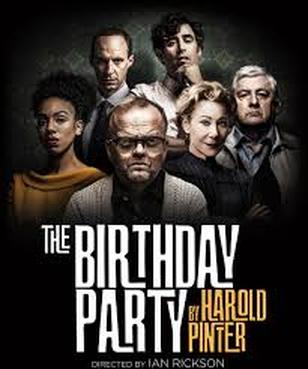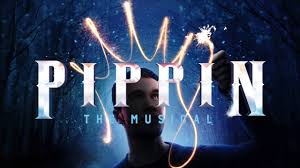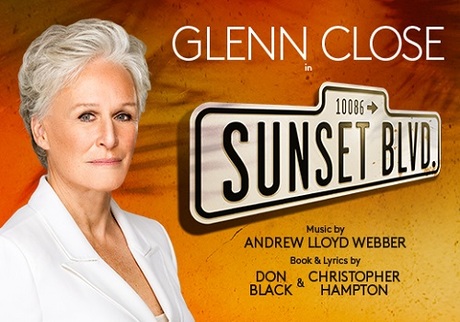 London's Production of "The Birthday Party" Could Actually Make Someone a Fan of Pinterby Randi / March 15, 2018
London's Production of "The Birthday Party" Could Actually Make Someone a Fan of Pinterby Randi / March 15, 2018“Pippin” is one of my best known, and best loved, shows. It lends itself so well to grandiose ridiculous spectacle, like in the most recent Broadway production, while still having a beating heart, an eternally provocative book, and one of the best all-around scores in musical theatre. So I was intrigued to see what a little almost-black-box of a theatre like Southwark Playhouse could do with the material. It’s been a long time since I saw a production of Pips that wasn’t full-out Cirque du Soleil treats – in fact, the last time was in high school, when I was indeed in a non-circus non-world-class-acrobat version. I couldn’t help but wonder (just a little call out to Miranda running for governor treats!), how strong are the bones of the show? Will it still produce the thrills and astonishment I remember even without all the flying through the air with the greatest of ease? And the answer is, those bones must have read The China Study and learned about how milk really isn’t the answer to osteoporosis and instead they’re eating vegetables and doing resistance training because hell yes, they are strong.
That story is the really not historical tale of Pippin, the son of King Charlemagne, and his coming of age as he tries to figure out what to do with his life in order to find fulfillment. He’s your typical young white male character, having literally all the resources and opportunities in the world open to him but feeling discontented and unsatisfied with this or that. He tries this or that, to continued exasperating dissatisfaction, because he believes himself to be destined for something extraordinary. I mean wow did they nail today’s white male youth or what. So Pippin’s story is told by a traveling troupe of performers, led by the Leading Player, and this performance that we are seeing is the very first with this particular actor playing Pippin. So every now and then we’ll get him doing something different from usual or a different ensemblist messing up, requiring the Leading Player to say something to remind us of that show-within-a-show frame. This is important, because the actor playing Pippin is having the same existential crisis as his character, and he’s subject to the same delusions of grandeur that Pippin is.
The Southwark Playhouse always does stellar work, in such a tiny space with pretty much nothing in terms of resources or special effects, or sets, really, so it’s entirely up to the cast and creatives to make magic. I was prepared to be blown away as I usually am here, with this theatre, effectively Off West-End, doing work that often is stronger than the proper West End shows (especially right now, when the favorite British musical winning over unsound audiences is, well, you know I don’t want to talk about that anymore). And while this was the most enjoyable musical I’ve seen in London in 2018 so far, it was heavily due to the material and not really this production in particular. The production was solid, don’t get me wrong, but not as great as I expected. And a few things rubbed me the wrong way. Like, the cast is entirely white, except maybe one ensemblist who might not be. I’m sorry to be making generalizations about her race but I’m trying to give them the benefit of the doubt that this show isn’t 100% white despite being performed in one of the most diverse cities in the entire freaking world, and even so it’s still a real let-down in terms of diversity. It’s weird, it’s obvious, and it’s just not right.
That whiteness means that the Leading Player, the lead role, is played by a white lady, which is JUST WEIRD. Now that was okay to do in my high school because my little suburb barely had Asian kids in drama club let alone black kids, but (Joey’s voice) in LONDON? The Leading Player is historically black, originated by the legendary Ben Vereen and then in the revival by the great Patina Miller, and a white lady just made it I don’t know, it made it like school. She was kind of a school marm. Genevive Nicole, talented as she is, was simply completely miscast, and only in part due to her race. She didn’t have the terrifying, exciting, mysterious, sexual, electrifying qualities that the Leading Player needs. And because her casting fell way short, for the first time, it really seemed like Pippin’s show. Despite being the title role, Pippin has always played second fiddle to the spell-binding Leading Player, whose actors have started illustrious careers on the magic they made in this incredibly meaty role. No matter how great Matthew James Thomas was in the 2013 revival – and he was REALLY great – it was still Patina’s show. I wasn’t lucky enough to see Ben Vereen in the original production, but come on, it’s freaking Ben Vereen. I think we can agree that he made the show. And that’s how it always is – the Leading Player lives up to the name, and Pippin is right up there with her but a little less extraordinarily, which is ironic because of the song he sings. But here, because the LP was weak and the actor playing Pippin (Jonathan Carlton) was actually the strongest one in the cast, the usual dynamic was flipped on its head and it became truly Pippin’s show. I was riveted more than usual in his plight and his growth as a character. The beauty of his songs stood out more. Meanwhile, the Leading Player became like a side character to me, just another of the ensemble except with more lines. She vanished completely into the shadows for me, and not in the good way that you expect the LP to be living in the shadows. It was incredibly interesting to witness this change, unintentional as I’m sure it was.
I was also surprised at the decision to have one actress (Mairi Barclary) play both Berthe and Fastrada. Pippin’s hilarious grandmother Berthe usually steals the show with her comedic bit, while Pippin’s conniving step-mother usually has a thankless song unless performed and directed perfectly. It makes some sense to double up on the roles, when you have a small cast, since they each have one big number and that’s pretty much it. But focusing on such different characters meant that a little was sacrificed from both. While a talented performer, Mairi made weird choices that didn’t work for me. Her Berthe got off easy, because the audience will eat up everything that character throws at you and be sublimely happy doing so, so that’s a hard one to mess up. Kind of like Charles/Charlemagne, it’s written to be adored and hysterical. It was just a little too goofy for me; when all the humor you need is written into the part there’s little need for bared teeth gags. But Fastrada was a mess. Her “Spread a Little Sunshine” is really hard to get anything out of, and it’s thankless unless she makes it obvious that she’s lying about spreading happiness and joy because her main goal is shrewd manipulation. None of that came across here, mainly because the actress was doing a heavy Scottish accent. And I mean heavy. Like worse than Mike Myers in “So I Married an Axe Murderer” when he plays his own grandfather and shouts “HEEEAD. MOVE. NOW!” It made no sense for the woman who is supposed to be gorgeous and sexy, so much so that the king is blinded to her scheming, to instead be kind of vulgar, calling herself a ‘hoosewife’ and letting the heavy accent get in the way of her subtle lines. I mean the whole “I’m just an ordinary housewife and mother, just like all your ordinary housewives and mothers out there” line is only funny because Fastrada clearly isn’t ordinary, and for damn sure isn’t a housewife. But here, yeah for sure she was just a dowdy housewife…so…. It didn’t work at all.
I did enjoy our Charles/Charlemagne, Rhidian Marc, who did a fine job. Like Berthe, that part is written to win over audiences with almost no effort, so any effort the actor puts in just makes it all the better. I particularly enjoyed his famous line, given in a little confidential bit to the audience after his wife asks for more money, when he says “You know, sometimes I wonder if all the fornicating I’m getting is worth all the fornicating I’m getting.” The audience dies every time, for good reason, but this time I was also crying laughing because I remember – someone from high school correct me if I’m wrong but I remember – that our HS production did NOT cut that line. Is that possible?!
Faring pretty well was Tessa Kadler as Catherine, more commonly the thankless role in “Pippin” unless you have someone who knows what they’re doing, and then it can be absolutely sublime. I never knew that Catherine could be the funniest and fullest role in the show until I saw Rachel Bay Jones in the Broadway revival, when she completely reinvented the role and all future interpretations were challenged to keep up. Unfortunately, few can really keep up with her, and even fewer have the comedic brilliance that’s required to make Catherine more than a well-meaning, pretty love interest. I could honestly talk about RBJ’s genius in that truly virtuosic performance for days on end. Needless to say, she ruined me for future performances that fail to mine the lines for all the brilliance they could possess. Tessa’s Catherine fared better than most, and she has a beautiful voice, but none of the nuance was there to make Catherine special. More importantly, it was not clear at all that the actors playing Catherine and Pippin in the show-within-the-show were falling in love, not at all. My husband, seeing “Pippin” for the first time, asked afterwards “wait why would she have left with him?” There was no reason for her to have joined Pippin at the end, at least as far as we saw.
And that ending is always so tricky to get right, because it is so unbelievably dark and sinister. The chorus sounded great on the Finale number, and it was creepy as hell as they tried to get Pippin to take part in the one final act that will make him extraordinary. It’s always fascinating to see how this comes across. Sometimes, the ending tells you that despite the grandest of dreams, a person will only be truly happy living an ordinary life that has real meaning instead of larger-scale meaning. Sometimes, it’s that you can’t expect too much of yourself or your life, and that doing so will probably have the opposite consequences than you intend, and sometimes it’s that you can’t give in to the basest desires that flood your subconscious. And sometimes you think um this is coming across as extra-pro suicide. Here, it definitely felt more along the lines of Pippin having to quiet the visions, the fantasies he always had that told him he was so special and so needed to do something obviously special. He needed to learn to ignore the dark places in his imagination and be content with a normal life, and only then, when he stopped expecting so much of himself, could he be happy. Overall, it worked, although again there was no foundation for having Catherine help ground him. It still was moving as ever, and because of the black box situation, I REALLY hoped we would get the original ending – when Pippin and Catherine just stand there in the dark in their underwear talking to each other, and it ends so abruptly and the audience is like, wait whatttttt? That can’t be the end?? That’s the ending we did in high school and it still makes me laugh so hard to imagine what on earth those poor audiences were thinking. But more recent shows have added a truly remarkable ending, in which the little boy playing Theo starts singing “Corner of the Sky”, and the Leading Player and the troupe come back in to encircle him, having found a new potential Pippin to finish their finale for them. It’s FREAKING DARK, and it works so well because it ends on music but still has the incredibly disturbing troubling mood. BUT, I think it really only works well when it’s a child playing Theo. Here it was just one of the regular ensemble members, adult-sized, playing Theo, so it didn’t pack the normal punch that that ending is good for. Also, when the players remove all the ‘theatre magic’ in a black box theatre, well there’s not much to differentiate it when they come back. There are no sets to begin with, so they kind of just made the lights dimmer. It didn’t work as well. It is the better ending though, so whatever it’s fine, but I just wanted to be able to witness an audience deal with the dissatisfaction of the original ending.
Overall, it was a well done production and definitely worth seeing, if it left me wanting to see a full mounted production again soon. And mostly, it reminded me of how great “Pippin” is, when even down to its bare bones, as here, it’s still enjoyable and poignant.
AUDIENCE
The audience was fine! Huzzah! It helps to be almost in the round in a small room, so everyone knows I’m watching them.







